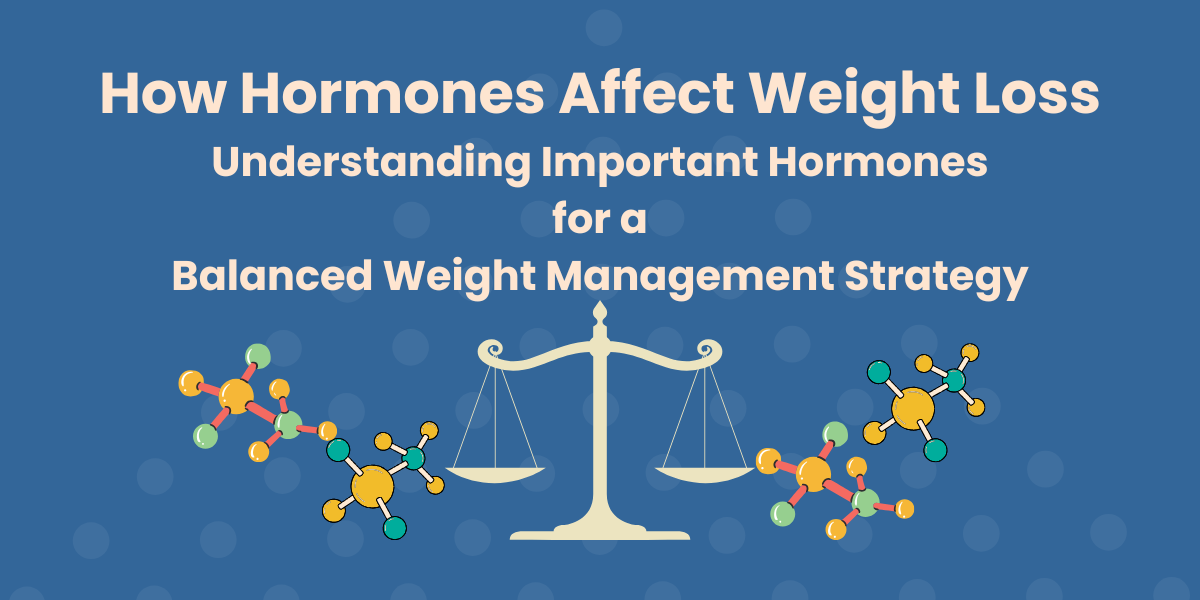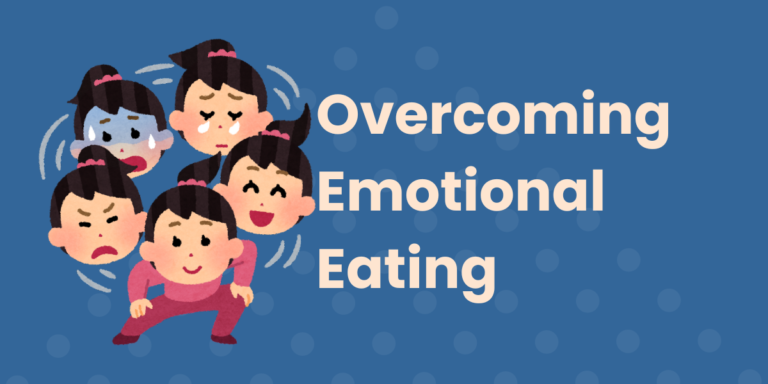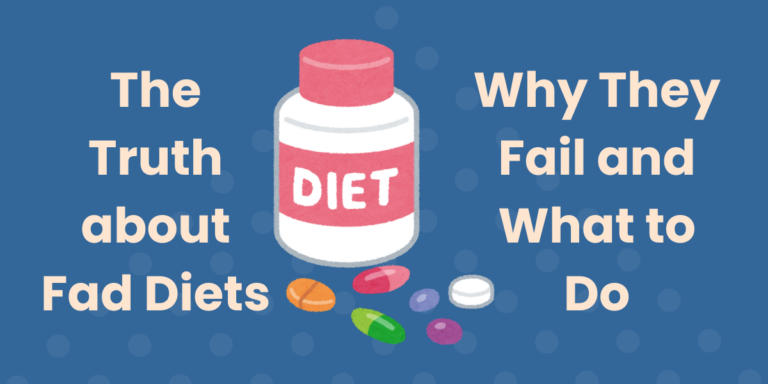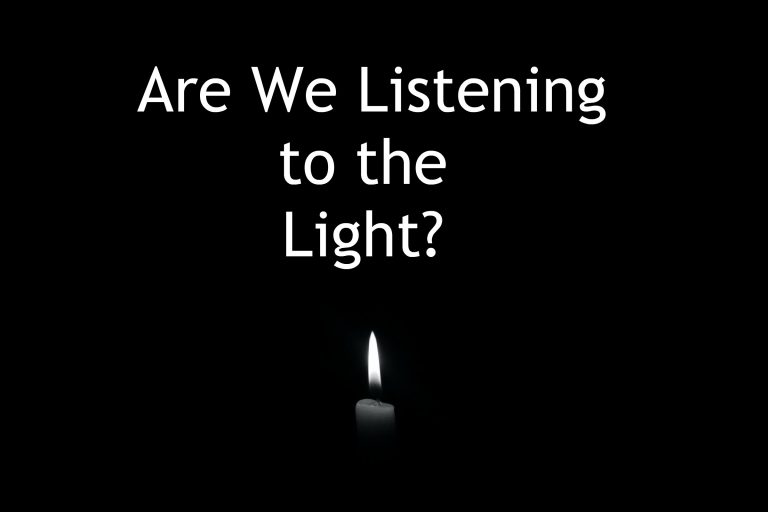How Hormones Affect Weight Loss: 6 Important Hormones for a Balanced Weight Management Strategy
What do you do when the scale won’t budge?
You spent hours on the treadmill. You cut back on sweets. You focused on clean eating.
You’ve worked so closely with your doctor, nutritionist, and coach so you know their life stories!
You meticulously tracked your calories, macros, and lab results and made beautiful spreadsheets that would make a data analyst proud.
You did everything right.
And yet… that damn scale won’t budge!
It seems like a cruel joke.
Somebody promised us results if we exercise and eat right.
We are supposed to “be healthy” by now.
Now that we finally decided to put in the work, we feel cheated out of our deserved rewards.
So what is happening?!
It looks like we’re missing something here.
Let’s take a step back, and have a look at how hormones play a crucial role in weight balance.
Let’s see how we can navigate towards the results you’re looking for and what you can do to work with them effectively.
The Role of Cortisol in Weight Loss
TL;DR – Story Time
- There once lived a valiant hormone named Cortisol. Every day, Cortisol worked hard to help people cope with stressful situations. However, people misunderstood Cortisol and did not appreciate its efforts. Cortisol felt defeated, but determined to continue its mission despite the bad PR.
- One day, scientists discovered that Cortisol got overwhelmed and anxious about life. This lead to intense cravings and unwanted weight gain. People realized that they need to embrace Cortisol. So they began exploring ways to work with Cortisol rather than against it. They sought harmony with other helpful hormones like oxytocin, serotonin, dopamine, and endorphins.
- Everyone spent more quality time with loved ones, stayed active, and practiced mindfulness. Soon, they realized that Cortisol was never their enemy, but a close friend that needed acceptance and balance.
- By mindfully making small lifestyles changes, people found a powerful ally in Cortisol as they continued their wellness journey together.
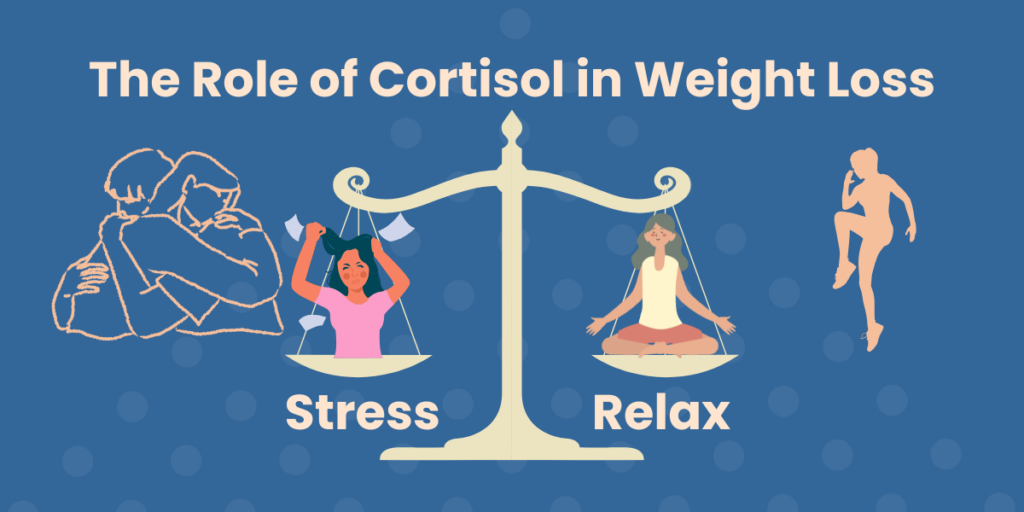
Practically everybody knows about cortisol these days.
Practically everybody knows its alias, the “stress hormone”.
It seems like every wellness article and supplement commercial paints the stress hormone in a bad light.
Since stress feels bad, it’s natural that we do everything in our power to avoid stress.
Sounds stressful!
Here’s the great irony I’ve wondered:
How do we need zero training to get stressed out, but we need all the training, therapy, apps, and sometimes medication in the world to consciously and deliberately achieve peace?
It seems like no one needs to teach us how to be stressed out but everyone needs to teach us how to de-stress when it happens.
So what do we do?
Scientists helped us realize that the body uses cortisol in an amazing survival system.1
Who wouldn’t want to have instantaneous energy on demand? Who wouldn’t want to run away from a lion?
It’s like Netflix with zero lag time. But as we all know, maintaining that subscription comes at a premium.
If cortisol levels remain high for a long time, then your body pays the price.2,3
If you pay that subscription fee for a long time, then your instant energy service begins to falter.
You might notice:
- Fatigue earlier in the day.4
- Cravings for bread, sweet treats, and coffee from the break room.5
- Tighter pants from the extra calories.
As we feel these things, we instinctively try to upgrade our “service”.
We try to push harder.
- More coffee.
- More treats.
- Stretchy pants.
How would things look if the best step forward is a downgrade?
The key is balance.
Finding Your Cortisol Balance
How do you balance cortisol with its dance partners?
- Oxytocin
- Serotonin
- Dopamine
- Endorphins
How do we create the space to create their beautiful choreography?
- Spending time and laughing with friends and family can elevate oxytocin levels.6,7
- Exercise and listening to music can boost serotonin levels.8,9
- Finding the right balance of social media use and time spent with friends and family will lower the likelihood of anxiety and depression.10,11
- Boost endorphins through exercises like running, walking, swimming, or lifting weights.12
- Mindfulness practice like meditation can reduce cortisol levels.13
Just remember:
We’re not here to shun cortisol from our lives.
You have the power and the ability to adjust your choreography and find the right dance.
Coach’s Guidance
It seems like you feel frustrated from working so hard and having nothing to show for it.
- What are your biggest frustrations when you feel stressed and how do you typically respond?
- How does understanding cortisol’s role in your body change the way you view stress?
- What small change could you make this week to manage stress levels better and support a healthier cortisol balance?
- How can you create small changes in your environment that makes it easier to prioritize activities that boost oxytocin, serotonin, dopamine, and endorphins?
- What support systems do you have in place, or what kind of support would be helpful, to maintain these stress-reducing habits?
Understanding Insulin and Its Impact on Weight
TL;DR – Story Time
- Once upon a time, a hormone named Insulin happily worked to help the body get energy from sugar. But something went sideways. The more Insulin worked to keep blood sugar in check, the more weight people gained.
- People got frustrated. How can doctors ask them to lose weight, but still prescribe Insulin? They soon realized that Insulin made a difficult decision: Save the waistline, or save the body. People realized that insulin was a hero that needed help.
- So people started exploring ways to work alongside Insulin. They combined mindful eating with regular exercise to maintain blood sugar levels, prevent complications, and create fitness.
- In this process, people realized Insulin as an ally in their health journey.
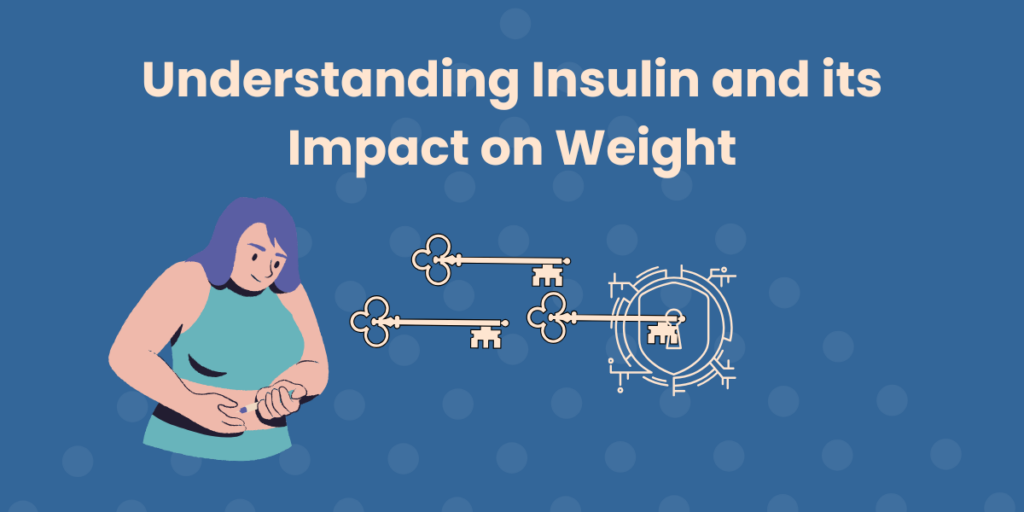
Here’s a frustrating paradox for patients and doctors:
Insulin, a medication that saves lives, comes with an annoying side effect – weight gain.14,15
Insulin may lead to weight gain among other dangerous issues like low blood sugar.
The more insulin you take, the more you might pack on pounds.
This creates an ironic challenge:
More weight makes diabetes harder to manage.16
The extra weight also heightens the risk of complications from other diseases like:
Since patients and doctors see weight gain as a nightmare, why do doctors prescribe insulin?
Because the alternative is more dangerous.
Uncontrolled blood sugar can lead to emergencies like:
- Diabetic ketoacidosis which demands hospitalization and treatment.18
- Kidney failure which requires hemodialysis. So we focus on prevention.19,20
- Vulnerability to uncontrolled infections which leads to amputations.21
- And more.
So what does this mean for weight loss?
There are some pearls that we can polish and shine.
- Insulin causes weight gain
- Insulin is actually your friend
Umm… What?
Your Body Is Smarter Than You Think
Just remember two things:
- The body always works towards optimal health.
- One thing can serve multiple purposes.
The body produces insulin because it is vital to life.
Almost every cell in your body has a lock.
Strangely, this lock is tucked inside the wall rather than the door.
If unlocked by the key (insulin), the cell temporarily installs the door for sugar to come in.
When the key (insulin) is gone, the cell removes the door.
Why on Earth would God create a system that could kill us?
It seems counterintuitive.
Wouldn’t you want life-giving sustenance to enter all cells freely?
Well… no.
Otherwise, that’s exactly how it would work.
So what’s happening?
Here’s the thing:
You rarely open the door to your house.
You surely need to pass through from time to time.
After all, we have to:
- Bring in the groceries
- Take out the trash
- Go to work
- Come back home
- Play outside
So, why not leave the door open?
In fact, don’t install a door at all. Just have a hole in the wall.
Sounds pretty ridiculous!
We all know that would be unwise.
There’s a reason our caveman predecessors decided to block the entrance with rocks.
Boundaries matter. You need to control what comes in and what goes out.
Without a door, you’d be at the mercy of:
- Weather
- Intruders
- Lions and fire-breathing dragons
Your cells work the same way – controlled boundaries are necessary to function well.
Working With Your Body’s Design
What does this mean for someone who wants to lose weight?
You possess a powerful key at your disposal.
Insulin can help you get in and out of shape by:
- Creating an environment conducive to muscle health.22,23
- Store extra energy if you overeat consistently.24
The secret is how to use it.
Many exercise and diet strategies seem to capitalize on this piece of science.
So we get:
- Intermittent fasting.
- Ketogenic diets.
- Cut and bulk exercise programs.
While each of these strategies has its advantages in addressing certain diseases, these programs seem to miss something important.
Your body’s primary strategy is always homeostasis – Balance.
Remember:
Your body always works towards achieving balance.
That’s the focus.
Nobody needs an MD, PhD, or RD to realize that salty snacks or sugary drinks do little good in the long run.
We don’t need to know the detailed intricacies of how insulin works to choose whole foods mindfully.
We can mindfully balance a healthy mindset, which naturally translates to:
- A healthy diet
- Guilt-free indulgance
- A satisfying life
Again, balance is the name of the game.
Coach’s Guidance
It seems like you are doing your best and following your doctor’s advice, but still feel trapped by the cycle of taking a medication that makes you gain weight.
- What does a typical day of eating look like for you?
- How do you feel your current diet, exercise level, and medication regimen is supporting your energy levels and overall health?
- What challenges do you face in making healthier food choices consistently?
- How might understanding your body’s response to insulin influence your decisions about when and what to eat?
- What concerns can you bring to your next doctor appointment?
- What could be the first small step you might take toward more mindful eating?
The Significance of Leptin and Ghrelin in Weight Management
TL;DR – Story Time
- Deep within our bodies lived two hormones that never agreed on anything. Leptin always felt Ghrelin ate too much, and Ghrelin thought Leptin never ate enough! Ironically, this system worked well and they walked hand-in-hand!
- However, they can get confused on their path to the brain. They took a left instead of a right. Surprisingly they get hungry for sleep or water instead of food.
- People realized this discrepancy and started paying attention to their bodies’ signals. They mindfully listened to the whispers of these hormones and resolved their struggles.
- People learned to build a deeper awareness through this journey of self-discovery. Instead of reaching for a snack, they ask Ghrelin and Leptin what’s missing. They are often grateful to be heard finally.
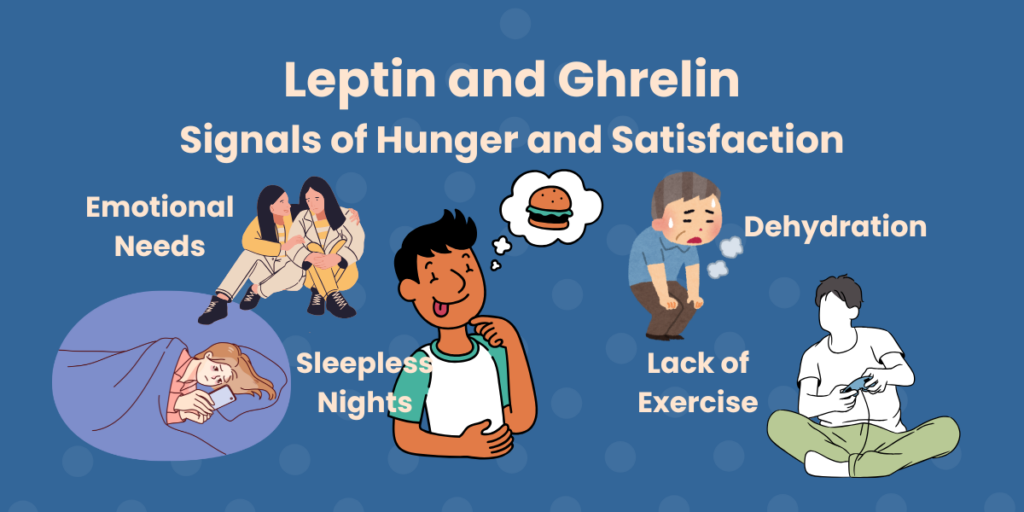
Leptin and ghrelin must feel left out.
They don’t get much press coverage.
Why?
I’m not sure.
Everyone knows cortisol = the stress hormone.
Everyone knows insulin = blood sugar control.
But who are leptin and ghrelin?
Leptin is the hormone that tells you,
- “I can’t possibly eat another bite!”
- “The thought of food makes me feel nauseated!”
- “I’m completely satisfied.”
Ghrelin is the hormone that tells you,
- “Raid the fridge and cupboards!”
- “I’m so hungry, I could eat an elephant!”
- “I’m STARVING! I’ll eat anything!”
The balance of leptin and ghrelin signals the desire for food.25
Or does it?
The weird thing is that these signals can get crossed in the brain.
Leptin and ghrelin act in many locations, including the hypothalamus.26
The hypothalamus is the seat of many basic drives including:
- Hunger
- Thirst
- Sex drive
- Body temperature
- Sleep
- And more27
All these drives are controlled in a space the size of an almond.28
So it’s easy to cross signals.
Why does this matter to someone on a weight loss journey?
Because feeling hungry doesn’t necessarily mean being hungry for food.
Hungry just means you’re hungry for… something.
Just like the driver who has their turning signal on. The only thing you can assume is that their turning signal is on.
It’s annoying. But it is what it is.
We can go down the list and troubleshoot the hunger signal.
- Did we sleep well last night?
- If not, then sleep it off.
- Have we been staying hydrated?
- Get a glass of water.
- Have we been feeling too hot or cold?
- Adjust the thermostat or exercise.
- Have you been in a desert?
- You can handle this at your discretion.
- When was the last time you ate something nourishing?
- Your body may be asking for a nutrient(s).
Sometimes what you’re craving isn’t food at all.
However, systematically addressing each potential problem helps you find what needs fulfillment.
So how would it be if you chose a different path?
Now that you know what leptin and ghrelin feel like and what they’re trying to tell you, how does that help you build personal awareness?
It seems impossible to know what you need in a given moment.
However, we can reflect on what we’ve been neglecting.
Examine the lifestyle factors and the answer will come.
Coach’s Guidance
It seems like you feel frustrated and guilty when those hunger pangs don’t go away after raiding the fridge. That’s ok
- What sensations do you typically associate with feeling hungry?
- How easy or difficult is it for you to distinguish between physical hunger and cravings for water, sleep, exercise, emotional well-being, etc.?
- What factors do you think might be contributing to any confusion in your hunger signals?
- How would addressing sleep, hydration, or emotional needs before eating change your approach to managing your weight?
- What might happen if you focused on fulfilling underlying needs instead of immediately reaching for food?
GLP1: The “Magical” Drug That Dreams Are Made Of
TL;DR – Story Time
- GLP-1 adored the spotlight! People adored GLP-1 when the pounds melted away. So GLP-1 knew the recognition was hollow. Furthermore, rumors began surfacing about health problems. This isn’t what GLP-1 wanted for itself.
- So GLP-1 went back to its roots to rediscover its true purpose in life.
- This led people to take a closer look at what truly matters for their health. They faced hard questions about the risks of weight loss, well-being, and overall health.
- The introspection has created a mutually supportive relationship. People realized the GLP-1 is a dear friend that must be balanced with informed choices that prioritize long-term wellness over rapid results.
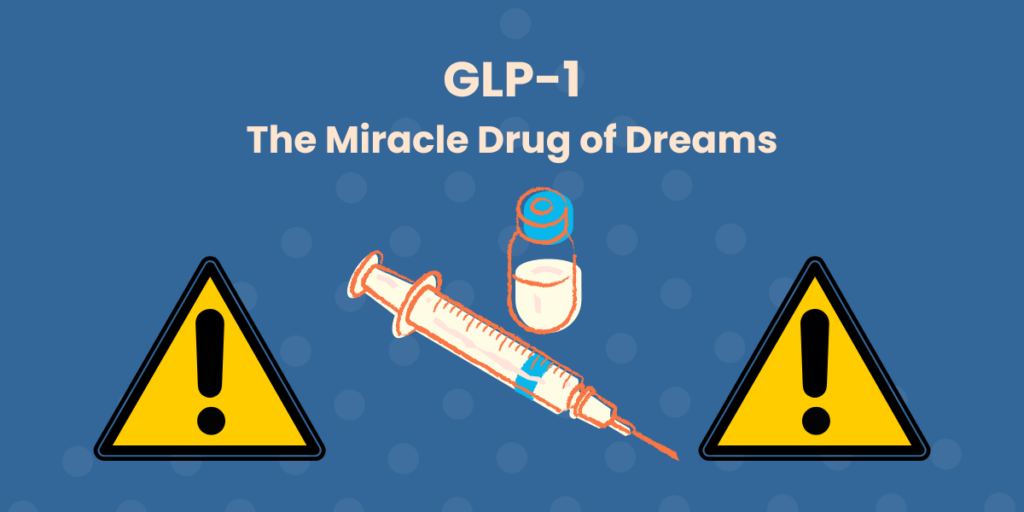
GLP-1 agonists have exploded in popularity.
This “magical” medication seems exalted to savior status.
Millions of people see their hopes and dreams of fast weight loss coming true with this miracle drug.
But we have to navigate a lot of red tape:
- The FDA mostly approved this medication for diabetes, not weight loss.
- Therefore, most insurance companies only cover it for diabetes.
- Few alternatives can be covered for weight loss.
- These medications are still new.29 So we don’t know all the long-term effects (like when they came out with COVID-19 vaccines and that aftermath).
- We must monitor labs closely to ensure organ systems remain healthy.
While navigating the red tape, people seem to forget that GLP-1s are real medications.
Starting any medication requires careful consideration of the pros and cons impacting:
What Do GLP-1s Do?
Among other functions, GLP-1 is a hormone that acts like a digestive speedometer.33
- It controls how fast food leaves the stomach.
- It reduces appetite so you eat less.
- It calibrates itself based on the nutrients available.
- It checks itself against other hormones to regulate energy levels in the body.
So it’s like a speed limit sign that constantly changes.
This hormone can slow down the digestive tract so you feel full faster and stay full longer.
Therefore you don’t eat as much and people lose weight.
When a GLP-1 medication is taken, the body is reduced to “calories in versus calories out”.
We upset the finely tuned instrument of the digestive tract.
Here’s the yellow tape of caution:
- Malnutrition
- If GLP-1 gauges the nutrients in the digestive system, is it wise to circumvent that and deprive the body of vital nourishment?
- Irreversible GI paralysis34
- How can you achieve optimal health if emptying the stomach and digestion slows to a crawl?
- Other unknown complications that haven’t been discovered yet
- You might be stuck taking the medication just to maintain your weight
Here’s a thought that seems to fly in the face of media and medical advice today:
- You WANT to gain weight.
- Not only that, you want to gain weight easily and efficiently.
- More than that, you want weight loss to be VERY difficult.
What?! Why?
“I thought I needed to lose weight to be healthy! Now you’re telling me that I need to gain weight to be healthy??”
“You’re not making sense! You’re absolutely crazy. Are you even a doctor?”
Let’s take a financial approach
You want a system designed to extract as much nourishment as possible while using as little energy as possible.
In other words, you want a high return on investment to make a profit.
You want to be frugal and find the best deals.
Why pay the retail price for a Louis Vuitton handbag when you can get a steep discount at the outlet mall?
You can save the money you would have spent and still get the bag you want.
It seems weird to think economically about nourishing the body.
Your body is constantly looking for the best deal and to save more.
So the GI tract needs to be frugal and thrifty to hunt down the best gastronomic deals.
A big part of bargain hunting is timing.
Having more GLP-1 than necessary can help you spend more time bargain-hunting at one store, but eventually, you have to go to the next store.
If you stay in the same store, you reach a point of diminishing returns.
Ironically, that seems to be when the ” magic” of the medication works.
We use more calories than we take in.
However, the body will realize that the math doesn’t add up.
Therefore self-preservation mode kicks in.
When we hit this plateau, we go to the doctor for a higher dose.
With a higher dose, we might lose a little more weight until the next plateau.
The vicious cycle repeats and we squeeze our bank accounts for every last penny.
What’s worse than being broke?
Having to work just to pay the bills and get out of debt.
Your body is the same.
Now you must continue taking the medication just to maintain your weight or stop gaining as fast.
There is a way to break out of this vicious cycle.
We can take a balanced approach.
We all know what we need to do.
The question is:
How do we get there?
Coach’s Guidance
It seems easy to spiral out of control and get stuck in a loop that was supposed to be the answer to our prayers.
- What are your primary goals and expectations when it comes to weight loss?
- How informed do you feel about the potential benefits and risks of GLP-1 medications?
- What concerns, if any, do you have about relying on medication to manage your weight? How might you talk to your doctor about them?
- How might a more balanced approach, combining lifestyle changes with medical interventions, support your long-term health and well-being?
- What would it look like to prioritize a sustainable, balanced approach over a quick fix?
Understanding Your Thyroid’s Role
TL;DR – Story Time
- Thyroid hormone was on top of the world! Thyroid governed the body’s entire metabolism and energy system. It was always fair and just to all cells of the body.
- However, the Thyroid felt a little “off”. Its citizens felt the impact. Fatigue, hair loss, and weight changes began to create cracks in their health. There were even concerns about life-threatening issues!
- So people began to notice these changes and sought medical advice early. They learned that Thyroid works in concert with other hormones, medications, and nutrients.
- Finally, they understood that Thyroid is part of a bigger picture. Optimal health does not come from correcting one hormone. Health is a balanced partnership throughout the body’s entire system.
- By combining proper medical care with lifestyle adjustments, they found a more effective path to restoring wellness.
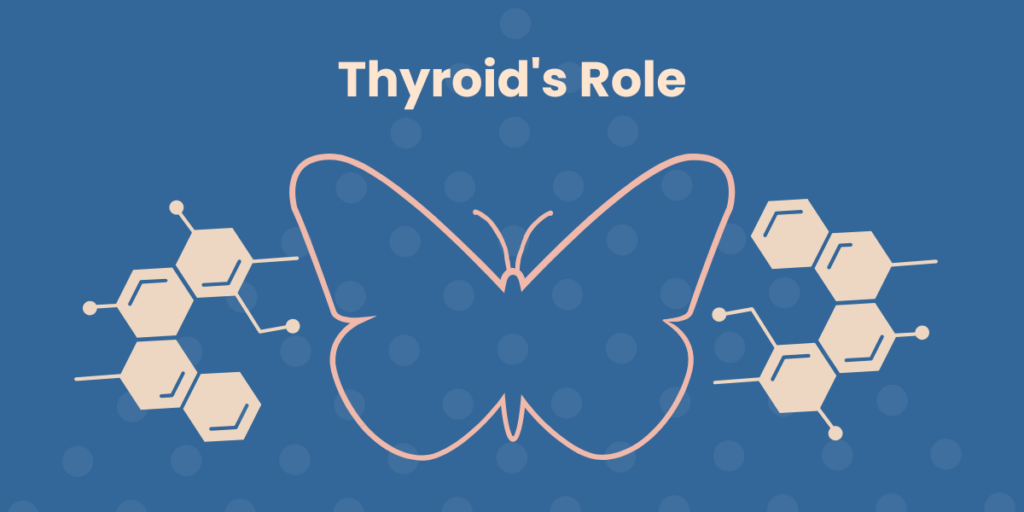
Here’s a curious question:
Why isn’t thyroid hormone the #1 weight loss drug?
If you think about it, thyroid hormone should be more popular than GLP-1 medications because:
- It controls the speed of metabolism
- Manages energy levels
- Manages lipid (fat) metabolism35
However, the imbalance created by high or low levels can risk life-threatening complications.36
Yet people have a pretty good idea of how the thyroid helps with weight management.
The process of discovery is drawn out and agonizing.
Usually, the patient has been dealing with vague issues that build up over time.
- Your favorite jeans don’t fit anymore. – “I know I need to cut back on sweets.”
- Coffee isn’t waking you up like it used to. – “Maybe I just need another cup.”
- Difficulty concentrating at work. – “I’m just stressed.”
- You can’t focus on your favorite Netflix show. – “I’ll sleep better tonight.”
Then something breaks:
- Your boss notices your work slipping.
- You have to buy new clothes – again.
- Your period goes MIA.
- Your shower drain and hairbrush look like furry creatures.
So you rush to the doctor to run some tests.
Lo and behold, the thyroid is underactive.
You’re slapped with a diagnosis and provided with thyroid hormone replacement to normalize the lab results.
Once the labs return to normal, we pat ourselves on the back for a job well done.
In the meantime, the patient still feels “off”.
So what’s going on?
What have we failed to appreciate?
The thyroid hormone needs to be balanced with:
Remember: The thyroid doesn’t work alone.
Certainly, if you’re experiencing symptoms including but not limited to:
- Fatigue
- Difficulty concentrating
- Hair loss
- Weight gain or weight loss
- Irregular periods
- Sensitivity to heat or cold
Then speak with your doctor and find out if something is wrong.
If Everything checks out, then start reflecting on other aspects of your life:
- Diet
- Exercise
- Emotional well-being
- Mental health
- Environment
- Smoking
- Alcohol consumption
Remember:
Something or a combination of things has created an imbalance.
It’s our job to correct that imbalance and achieve greater alignment with who you are meant to be on this Earth.
Coach’s Guidance
It seems really easy to just say weight gain or other symptoms is due to genetics or age.
- What signs or symptoms have you noticed that might indicate a thyroid imbalance? How would you bring this up with your doctor?
- How do you feel your current lifestyle is supporting your thyroid health?
- What lifestyle changes could have the greatest impact on how you feel?
- How might a more holistic approach to your health, considering diet, exercise, and emotional well-being, benefit your thyroid function?
- What’s preventing you from prioritizing these areas?
Recognizing Signs of Hormonal Imbalance
TL;DR – Story Time
- Imagine a beautiful symphony of hormones. They each flowed smoothly with one another and played a vital role in the body’s harmony.
- People eventually realized that disrupting the harmony can create various health issues.
- So, they started to mindfully notice small clues and signs like fatigue, mood swings, and weight changes, recognizing them as potential indicators of hormonal imbalance.
- Because of that, people were more open to speaking with their doctors and exploring lifestyle changes to restore harmony.
- They learned the small clues as an opportunity for self-reflection and better health.
- As a result, people redefined the bathroom scale. People embraced the opportunity to listen to their bodies and make choices that align with their values and overall well-being.
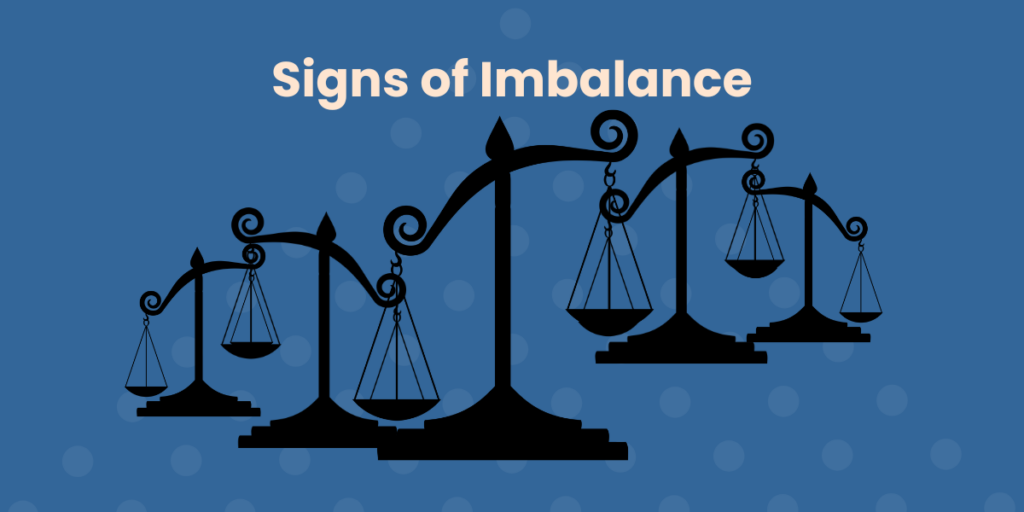
Your body is a symphony of hormone-harmony.
Every hormone, and every musical note, is well balanced.
If one violinist plays the wrong note, no one notices.
If one extra molecule of cortisol exists, the body remains harmonious.
What if another violin plays the wrong note? What if the whole violin section plays the wrong note? What if each violinist plays a different wrong note?
Things can go sideways and the harmony becomes discordant.
At that point, you will have to evaluate other things including but not limited to:
- The sheet music
- The skill of the violinist
- The quality of the instrument
- Even the conductor
So if you have gained weight unintentionally, then the doctor has some questions for you.
- Are you feeling energized or do you feel sluggish?
- Are your menstrual cycles regular?
- Have there been any changes to the frequency and or the flow?
- Have you noticed any mood swings?
- Have you noticed a greater sensitivity to hot or cold temperatures?
- For example, do you still wear a coat outside even though it’s boiling hot?
- Or do you go out in the polar vortex wearing your summer clothes?
- Have you noticed any changes in your sleep?
- Have you noticed any changes in your appetite or thirst levels?
- Are you going to the bathroom or frequently?
- Have you noticed any explained changes in your weight whether it would be up or down?
- How much did you gain or lose? Over what time period?
Going through these questions with your doctor helps indicate how your hormones became imbalanced.
It’s perfectly possible to gain weight even though you’re doing everything right.
But you have to look under the hood to check all systems and notice anything weird.
So, if you notice anything that feels off balance, use that as a sign to talk with your primary care provider for a check-up.
If everything checks out with your doctor, then use the opportunity to explore any lifestyle changes that bring you greater alignment with who you are and the values you hold dear.
Coach’s Guidance
It seems too easy to feel unbalanced and say it’s the “new normal”.
- What does a typical day look like for you?
- How would you describe your overall energy levels and mood on most days?
- What changes in your body or behavior have you noticed recently that feel ‘off’ or imbalanced?
- How might paying closer attention to these subtle signals empower you to take better care of your health?
- What concerns might you bring to your doctor’s attention?
- What’s one thing you can do today to better align your actions with your personal values and well-being?
Conclusion – How Hormones Affect Weight Loss:
I want you to remember something:
- You don’t need an MD or PhD in hormones to make healthy choices.
- You don’t need to understand every biochemical pathway to navigate the maze of a supermarket.
- You already know more than you realize.
- Your body is on your side.
So when you step on that bathroom scale, think about what that number represents.
Of course, that number reflects your total weight at that moment.
But what if it’s telling you something else?
- Self-awareness
- Personal values
- Strengths and weaknesses
- Achievement and perseverance
How does that number help you understand how you have balanced your actions with your values?
How does that number help you gain clarity of where you are now and how you need to realign yourself moving forward?
Redefine the bathroom scale.
Instead of dreading the numbers, embrace the opportunity as a peek through a window for self-reflection.
We can open ourselves to being a more complete human.
Just remember:
- It’s not your job to balance hormones.
- Your body already does the heavy lifting.
- Speak with your doctor in case medications are required.
- Support your body to do its job well.
- Optimize your body’s environment so you enjoy optimal health.
Health and Wellness coaching
Would it be a bad idea to work together now?
If You’re Not Ready Yet, That’s OK.


